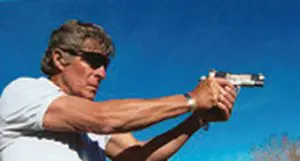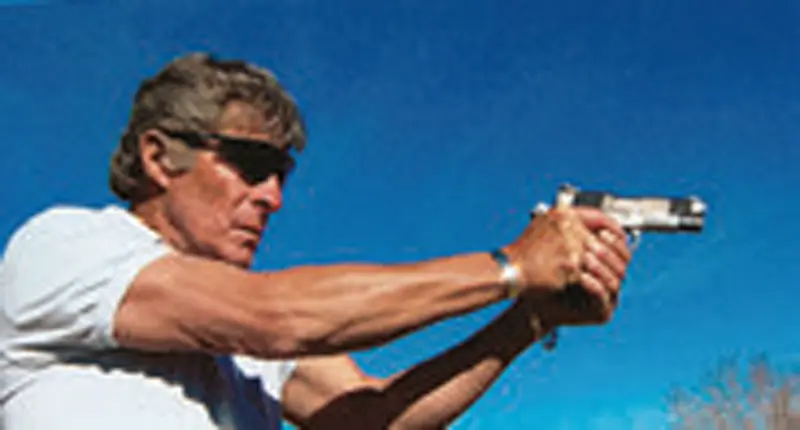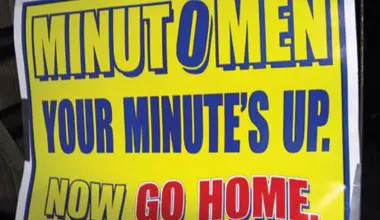I first met Louis at the Department of Energy’s SRT III course at Sandia, New Mexico. It was in the 1980s and a group of us from LAPD SWAT were adjunct instructors for the program. Louis had been hired by Ray Coffman, who coincidentally had been my roommate at the University of New Mexico, to join in the program. He struck me as extremely thoughtful and possessed an insightful and inquisitive nature.
Many years later, my training company, I.T.T.S., and Louis’ Yavapai Firearms Academy would co-teach a number of classes in California.
 Everyone approaches instruction differently. Louis was very soft spoken and his South African accent unmistakable. He did not rush his instruction, so you needed to be patient and listen carefully. He expounded on some very well-thought-out theories. He studied a subject, thought about it, and then taught it in his unique style. He did not suffer fools, which I always admire.
Everyone approaches instruction differently. Louis was very soft spoken and his South African accent unmistakable. He did not rush his instruction, so you needed to be patient and listen carefully. He expounded on some very well-thought-out theories. He studied a subject, thought about it, and then taught it in his unique style. He did not suffer fools, which I always admire.
Dinner with Louis made for unique conversations between the two of us. Due to the nature of Los Angeles living— in concert with “D” platoon activities— my hearing is not all that great. And Louis spoke very—very—softly. This meant that at best, I could catch only about every third or fifth word relative to whatever we were discussing.
His South African pronunciation of the English language required rapid translation on my part as well. Being the dutiful street cop, I simply tried to fill in the blanks so as not to appear totally clueless when he spoke. This resulted in about 80% of my responses to a question eliciting a confused and quizzical look from Louis, accompanied by, “What are you saying, Scotty?” “Well, I thought you said …” This meant that any conversation between us took about four times as long as needed.
What I will miss the most about Louis is that he was born of another era long gone. It was an era of honesty and of being precisely who you say you are. Of having done what you say you’ve done. Of being true to yourself. His view of the modern world was—as is mine— a somewhat dismayed and incredulous take on the state of things.
In an era when everyone shares anything and everything about themselves, regardless if anyone wants to hear it or not, Louis was low key, low profile, and always insightful.
A classic example of Louis’ traditional old-world upbringing was his penmanship. It was calligraphy in its highest form. How he did this is beyond me. For those of you with autographed copies of his works, study the handwriting, which says it all. It is most assuredly a lost art.
Louis followed the Einstein school of fashion. Black jeans, vest, white shirt and, from what I observed, absolutely no sunscreen. No matter the weather conditions, this ensemble never varied.
Now that I think about it, this speaks to his very practical nature. He always wore an emblem on his belt that appeared to be a sterling silver Zulu shield with crossed spears. It was quite obviously in homage to his native country. Since some rather historic battles were waged in that land, it was fitting that Louis embodied that spirit of adventure. He was well versed in the history of the frays that had transpired in his homeland, and it was always interesting to discuss the subject with him.
Louis found out that I had a keen interest in photography and especially photos utilizing Leica cameras. I talked about the black and white photos Henri Cartier-Bresson had taken with Leicas. The next time I saw Louis, he presented me with his father’s World War II-era 35mm Leica camera. It sits in my office and is a reminder of his generous nature.
For those of you not familiar with his works on shooting and training, I highly recommend them. They are straightforward and espouse common sense, much as the man himself. He was a journalist at one point, and his clear writings demonstrate that. Louis was one of the few instructors I recommended to those seeking training. He was a pleasure to work with and had a lifetime of knowledge that he shared with his students.
Louis lived life on his own terms. He traveled around the country for many years in his truck. Putting 200,000 miles a year on the road simply to teach was remarkable by any standard. There was a method to packing that truck for his classes, and he had it down to a science.
He had seen the whole of the United States, its people and customs. With such personal insight into the land, he had unique takes on the many subjects we discussed. He was possessed of a dry wit and intelligence, which he coupled with carefully chosen words.
With Louis’ passing, it reminds me of appreciating those around us while we can. We will miss him.



